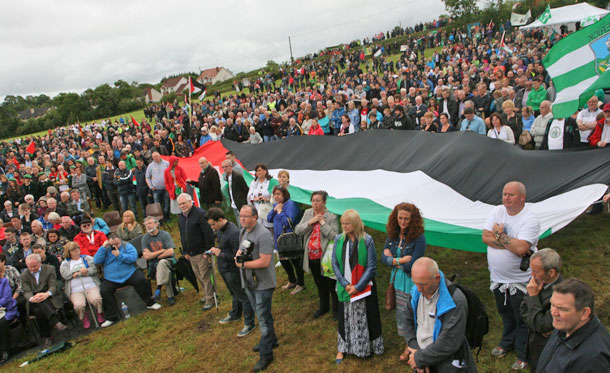1 September 2014 Edition
Remembering the Hunger Strike and Gaza martyrs

• Marchers carry an 80-foot-long Palestinian flag in solidarity with the people of Gaza
The Palestinian Ambassador told how, as a Palestinian refugee living in Lebanon, he and his people were inspired by the courage and sacrifice of the H-Block struggle of 1981
ALONG the main street of the County Fermanagh village of Derrylin on Sunday 3 August, the thousands marching to remember the 1981 Hunger Strike with a myriad of flags and banners (and many Palestinian flags) was a sign of the exuberance of republicans in Ireland today.
In the run-up to this year’s National Hunger Strike Rally, republicans across the country looked in anger and frustration at the slaughter of largely defenceless Palestinian men, women and children by a bloodthirsty Israeli war machine hell-bent on the destruction of Gaza.
So, in a demonstration of solidarity with the people of Gaza and Palestine, the Hunger Strike Rally organisers invited the Palestinian Ambassador to Ireland, Ahmad Abdelrazek, as a special guest speaker.
People were encouraged to bring Palestinian flags and they did so, in large numbers.
The flute bands who played added the red, black, white and green of Palestine to their colour parties. Some had special T-shirts printed for the day.
Despite the horror of the genocide that was at its most intense around the weekend of 3 August, the Palestinian representative spoke of his pride in meeting members of the families of Long Kesh Hunger Strikers present at the march.
He also recalled how, as a Palestinian refugee living in Lebanon, he and his people were inspired by the courage and sacrifice of the H-Block struggle of 1981.
This was in the year before the ruthless Israeli Defence Minster Ariel Sharon oversaw the invasion of Lebanon with the massacres of both Palestinian and Lebanese civilians, concluding with the butchery of the Sabra and Shatilla refugee camps on the outskirts of Beirut.
The message of support and comradeship shown to Gaza on the day of the National Hunger Strike Rally will have reverberated back throughout the country as republians from Derry to Kerry, Belfast to Cork, Gorey in Wexford to Carrick-on Suir in Tipperary, from Cabra, Kilbarrack and other areas across Dublin in the east to Galway in the west and Donegal in the north carried it with them.
And this is important as the Irish mainstream media, in the style of the Section 31 censorship that is supposed to have been ended, largely ignored the event.
For republicans remembering our Hunger Strikers from the H-Blocks along with Michael Gaughan and Frank Stagg and going back to Tony D’Arcy from Galway or Terence MacSwiney is also about our rejection of British and often Free State governments’ attempts over decades to criminalise the struggle for Irish freedom.
In the build-up to the 1981 Hunger Strike British Prime Minister Margaret Thatcher (that friend of Zionism and Chilean dictator General Pinochet and supporter of South African Apartheid) said the Hunger Strike was “the IRA’s last card”.
A pity she wasn’t around to see the thousands of people on 3 August in the Fermanagh & South Tyrone constituency where Bobby Sands was elected as MP by 30,000 votes. She would have heard the laughter of hundreds of children and witnessed the tattered remnants of her defeated criminalisation policy.
But republicans should be aware that the unionist leadership is trying to breathe life into the moribund criminalisation strategy.
We witnessed this in the weeks prior to the Derrylin parade from leading unionist politicians, in particular Arlene Foster and Tom Elliot.
DUP Minister Foster claimed the parade was to “glorify terrorism and I find that incredibly hurtful, offensive and I am sure that those people who have lost loved ones in the Derrylin area feel the same way”.
Former Ulster Unionist Party leader Tom Elliot (who in May 2011 referred to Sinn Féin as “scum”) said: “We must remember that those who were on hunger strike were in prison; they were in prison because they were terrorists and criminals who had broken the law.”
The pattern is clearly developing that any commemoration or event organised by republicans is being targeted by unionists using the language of criminalisation as they attempt to deflect attention from their lack of political leadership on the one hand and their paranoia over the increasing electoral success of hardline unionists such as Jim Allister’s Traditional Unionist Voice.
Fermanagh & South Tyrone Sinn Féin MP Michelle Gildernew gave the keynote address. She said republicans acknowledged the ongoing pain of those “saddened, offended or angered” by the event but added “that was never our intention”.
She said DUP leader Peter Robinson and other unionist leaders had “sought to sectarianise” the occasion and then criticised how the DUP and UUP had recently mishandled all-party talks at Stormont.
“As unionism has created an axis to oppose the Good Friday Agreement,” Michelle Gildernew said, “those who support it, including the British and Irish governments, need to build a pro-Agreement axis.”




